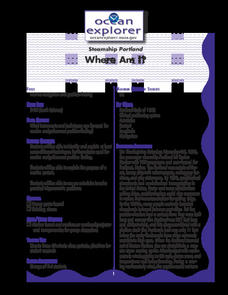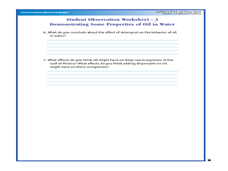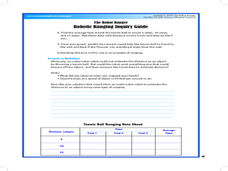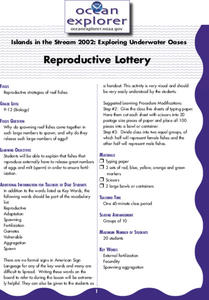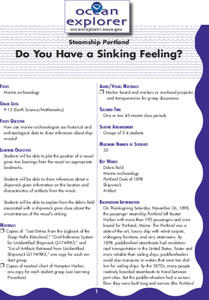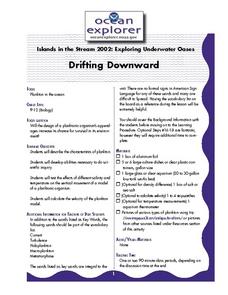Curated OER
Where Am I?
Sudents examine the types of instruments that can be used for marine navigation and position-finding. They practice using an astrolabe to solve trigonometric problems.
Curated OER
X-Storms
Students compare and contrast 3 types of extreme storms. They obtain real-time and historical meteorological data regarding 2 specific storms and then analyze the data to determine what type of storm each was.
Curated OER
Hot Food
Students compare and contrast photosynthesis and chemosynthesis as processes that provide energy to biological communities. They investigate the energy content of hydrocarbons used in coral communities.
Curated OER
My Wet Robot
Students design an underwater vehicle. In this engineering lesson, students will design an underwater robot that includes specific systems for it to function properly. Each group will present their prototype to the class.
NOAA
What's New?
Biodiversity in some areas is more diverse than one might think. Using a two-day instructional activity, pupils consider the biodiversity of the Hudson Canyon and the characteristics of one organism. They begin with an analysis of the...
Curated OER
Life on the Hardbottom
Students find similarities and differences between a biotrope habitat and an ecosystem. For this hardbottom biotrope lesson, students research and respond to inquiry questions about a biotrope. Students identify three biotropes in the...
Curated OER
Oil Floats, Right?
Students examine the properties in oil in water. In this mixture lesson, students read about the Lophelia II 2010: Cold Seeps and Deep Reef Expedition and look at images of deep sea ecosystems. They experiment or participate in...
Curated OER
The Robot Ranger
Learners participate in an experiment to understand how robotic systems can estimate distances. In this robotic ranger lesson, students measure the the time it takes for and object to move back and forth. Learners will use a tennis...
Curated OER
Deep Lights
Students investigate materials that emit light. In this deep ocean lesson, students compare and contrast materials that emit light under certain conditions and infer the light-producing process. They explain three ways this evidence is...
Curated OER
Ship of the Line
Students discover boats by researching 18th century ships. In this Naval history instructional activity, students identify and describe the different components of an 18th century naval ship after researching information on the...
Curated OER
The Robot Archaeologist
Learners discover what is needed to program an underwater robot to complete a course of action. For this robot archaeologist lesson students design an archaeological strategy of an underwater vehicle.
Curated OER
Animals of the Fire Ice
Students examine ocean life by identifying methane hydrates. In this ocean life lesson, students research organisms that live in the coldest, deepest parts of the ocean and live off methane hydrates. Students create a group...
Curated OER
Its OK To Be a Clod
Middle schoolers describe factors that affect the solubility of a chemical substance in seawater. In this sea environment instructional activity, student explain how information on the solubility of a substance can be used to measure...
Curated OER
Coral Mania
Learners examine deep-sea coral. In this coral lesson, students identify the structure and function of a coral polyp. Learners then create a model of a coral polyp.
Curated OER
Mystery of the Alaskan Seamounts
Students study seamounts and the processes that form them. In this Gulf of Alaska lesson students interpret data and investigate a hypothesis.
Curated OER
Reproductive Lottery
Students explain that fishes that reproduce externally have to release great numbers of eggs and milt (sperm) in order to ensure fertilization.
Curated OER
How Does Your Magma Grow?
Students identify the three types of plate boundaries and the Earth's tectonic plates system. They examine how the Galapagos Islands were formed and hydrothermal vents.
Curated OER
What's the Difference?
Students discover how volcanic processes differ at convergent and divergent tectonic plate boundaries. They identify three geologic features that are associated with most volcanoes on Earth.
Curated OER
Do You Have A Sinking Feeling?
Students plot the positions of vessels given bearings in the form of landmarks. They explain how the debris field can help solve the mystery in how the ship sunk.
Curated OER
Recycled Treasures
Learners develop creative-thinking skills that they will use repeatedly throughout their life. In this early childhood art lesson, students develop creative-thinking, social-development, and language skills, and an awareness of the...
Curated OER
Drifting Downward
Learners study the effects of different salients and temperatures on vertical movement of an organism. In this experimental lesson students design different shapes of foil to simulate drifting planktonic organisms.
Curated OER
Easy as Pi
Students examine structural features. In this life science lesson students complete an activity and quantify the impact of various modifications.
Curated OER
Feeding in the Flow
Pupils examine current flow and describe ways in which it may effect food of reef building corals. In this coral lesson students identify two environmental factors that may affect the morphology.
Curated OER
It looks Like Champagne
High schoolers interpret phase diagrams and explain the meaning of vocabulary words. In this ocean explorer lesson students describe two uses of super-critical carbon dioxide.


